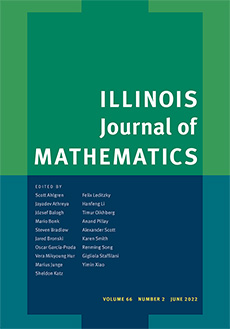Abstract
It was shown in \cite{NB} that if $T$ is a contraction in a Hilbert space with finite defect (i.e., $\|T\|\le 1$ and $\operatorname{rank} (I- T^*T) <\infty$), and if the spectrum $\sigma(T)$ does not coincide with the closed unit disk $\overline{\mathbb{D}}$, then the Linear Resolvent Growth condition $$ \|(\la I - T)^{-1} \|\le\frac{C}{\operatorname{dist}(\la,\si(T))},\ \la\in\bc\backslash \si(T) $$ implies that $T$ is similar to a normal operator. The condition $\operatorname{rank}(I - T^*T)<\infty$ measures how close $T$ is to a unitary operator. A natural question is whether this condition can be relaxed. For example, it was conjectured in \cite{NB} that this condition can be replaced by the condition $I - T^*T\in \fS_1$, where $\fS_1$ denotes the trace class. In this note we show that this conjecture is not true, and that, in fact, one cannot replace the condition $\operatorname{rank}(I - T^*T)<\infty$ by any reasonable condition of closeness to a unitary operator.
Citation
S. Kupin. S. Treil. "Linear resolvent growth of a weak contraction does not imply its similarity to a normal operator." Illinois J. Math. 45 (1) 229 - 242, Spring 2001. https://doi.org/10.1215/ijm/1258138265
Information





